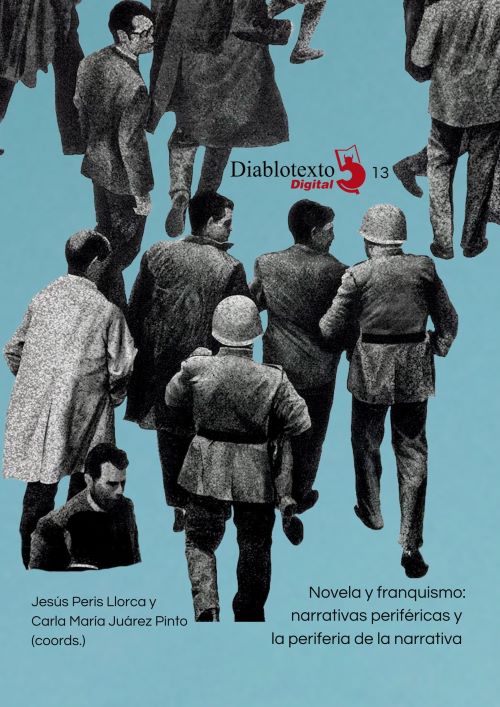"The middle” Spain of Manuel Chaves Nogales. A review of 'A sangre y fuego'
DOI:
https://doi.org/10.7203/diablotexto.13.25868Keywords:
Manuel Chaves Nogales, tercera España, canon, compromiso social, literatura comprometida Abstract
Abstract
The ‘Third Spain’ as supported by some authors and critics and rejected by others, was a concept that lingered in the Spanish society since the 19th century, and which includes a huge variety of authors who shared an ideology. This article seeks to take a step forward in the inclusion of Manuel Chaves Nogales in the ‘third Spain’, based on a review of A sangre y fuego, and by providing that he was part of this so-called New Romanticism group.
 Downloads
Downloads
 References
References
Bravo Cela, Blanca (2001). “Actualidad del grupo del ‘Nuevo Romanticismo’”, en Literatura y sociedad, el papel de la literatura en el siglo XX: I Congreso Nacional de literatura y sociedad, pp. 377-388.
Castañar, Fulgencio (1992). El compromiso en la novela de la II República, Madrid: Siglo Veintiuno de España Editores.
Cintas Guillén, M. Isabel (2009). El periodista comprometido: Manuel Chaves Nogales, una aproximación, Andalucía: Fundación Centro de Estudios Andaluces. Consejería de la Presidencia. Junta de Andalucía
Cintas Guillén, M. Isabel (2011). Chaves Nogales. El oficio de contar, Sevilla: Fundación José Manuel Lara.
Chaves Nogales, Manuel (2013). A sangre y fuego, Barcelona: Libros del Asteroide.
Díaz Fernández, José (2013). El Nuevo Romanticismo, Stockcero.
Espinosa, Francisco (2014). “Literatura e historia. Manuel Chaves Nogales y la ‘tercera España’”, en Pasajes: revista de pensamiento contemporáneo, 44, pp. 136-161, en https://roderic.uv.es/handle/10550/48885 [Fecha de consulta: 6 de julio de 2023].
Fuentes, Víctor (2006). La marcha al pueblo de las letras españolas, Madrid: Ediciones de la Torre.
Gala Cajigas, J. Miguel (2011). El Nuevo Periodismo de Manuel Chaves Nogales, Madrid: Universidad Complutense de Madrid. [Trabajo Final de Máster].
Martínez, M. Lara (2016). “La crítica literaria al maniqueísmo en la guerra civil. A sangre y fuego y El rey y la reina”, en Siglo: actas del V Congreso Internacional de Historia de Nuestro Tiempo, pp. 191-198.
Preston, Paul (2012). Las tres Españas del 36, Barcelona: Penguin Random House.
Riera, Joaquín (2016). La Guerra Civil y la Tercera España, Madrid: Almuzara.
Suberviola, Daniel y Torrente, L. Felipe (2013). Chaves Nogales, el hombre que estaba allí, Madrid: libros.com
Trapiello, Andrés (2011). Las armas y las letras, Barcelona: Ediciones Destino.
Valls, Fernando (2018). “Un estudio en marcha: sobre los cuentos de A sangre y fuego, de Manuel Chaves Nogales”, en Orillas: rivista d'ispanistica, 7, pp. 149-166. En http://orillas.cab.unipd.it/orillas/es/07_09valls_rumbos/ [Fecha de consulta: 6 de julio de 2023].
Vicent, Manuel (2016). Los últimos mohicanos, Madrid: Alfaguara.
Vilches de Frutos, M. Francisca (1982). “El compromiso en la literatura: la narrativa de los escritores de la generación del Nuevo Romanticismo (1926-1936)”, en Anales de la literatura española contemporánea, 7, pp. 31-58.
Downloads
Published
How to Cite
-
Abstract317
-
PDF (Español)222
Issue
Section
License
Licencia de reconocimiento de Creative Commons “Reconocimiento - No Comercia l- Sin Obra Derivada
Authors who publish with this journal agree to the following items:
The authors will keep their copyright and guarantee the journal the right of first publication of their work, which will be simultaneously subject to the Creative Commons license that allows third parties to share the work indicating its author and its first publication in the journal. The authors may adopt other non-exclusive license agreements to distribute the version of the published work (e.g., depositing it in an institutional telematic file or publishing it in a monographic volume), with an acknowledgment of its initial publication in this journal. The authors are allowed and encouraged to disseminate their work through the Internet (e.g., in institutional telematic archives or on their website) before and during the submission process, which can produce interesting exchanges and increase citations of the published work. (See Effect of Open Access)




